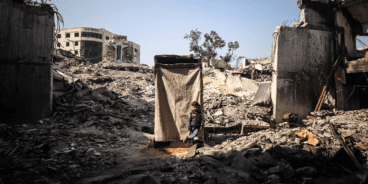
Never Again Let us Fail our Responsibility to Protect
Op-Ed by Dr. Simon Adams in the Canberra Times on the Responsibility to Protect, focusing on the Armenian massacre and Australia’s Anzac Day.
A line of blood connects us to 1915. Anzac Day not only represents one of the most harrowing events of the 20th century. As the Allies readied themselves to storm Gallipoli, leading politicians within the Ottoman Empire were preparing to eliminate Armenian Christians, whom they considered treasonous vermin.
On the night of April 24, 1915, the arrest of Armenian intellectuals began in Constantinople. Soon afterwards, massacres and mass deportations began across Turkey. By June, with Australian and New Zealand ‘‘diggers’’ entrenched in the Dardanelles, the genocide was well under way. In all, more than a million Armenians died.
Twenty-four years later, as another world war approached, Adolf Hitler commented that, ‘‘Who, after all, speaks today of the annihilation of the Armenians? Hitler was aware that despite fine speeches given in Paris, London or Washington in opposition to the Armenian genocide, most Turkish perpetrators had escaped punishment. He was trying to steady the nerves of his army commanders as they prepared to invade Poland. But his acolytes did not escape judgment. The horrors of World War II not only led to the Nuremburg trials, they inspired the formation of the United Nations.
After 1945 there was broad consensus that the stark slogan of concentration camp survivors, ‘‘Never again!’’, must be turned into reality. Australia was one of the first countries to join the new United Nations and ratify its Convention on the Prevention of Genocide.
Regrettably, the reality of the second half of the 20th century is not how much we did to make ‘‘Never again’’ a reality, but how little. From the killing fields of Cambodia to East Timor, Rwanda, Bosnia and Kosovo, mass atrocity crimes were generally met with international diplomatic passivity. The United Nations proved incompetent or impotent in the face of monstrous human rights challenges.
Nor did the new millennium start much better. The barren wastelands of Darfur provided a fresh stain upon our collective conscience.
This is precisely why the recent international willingness to act with regard to Libya and the Ivory Coast is so remarkable. Gaddafi and his ilk were not preparing genocide, but they had shown a terrifying determination to bomb protestors and commit mass atrocities. The Libyan regime had additionally promised ‘‘no mercy’’ as its troops prepared to wipe out the opposition city of Benghazi. Meanwhile in the Ivory Coast, President Gbagbo’s rejection of unfavourable election results, combined with his willingness to reignite civil war and to incite ethnic massacres, necessitated his removal. The Ivory Coast was in danger of developing into a slow motion re-run of Rwanda, with the world once against cast as passive spectator.
As imperfect as the UN Security Council’s Libyan ‘‘No Fly Zone’’ and belated attempt to pull the Ivory Coast back from the brink are, they represent an important turning point. The new willingness to act, rather than just talk, in protection of people facing mass atrocities is not only due to leadership from Washington, London and Paris, or because of global hostility to Gaddafi or Gbagbo. The new willingness to act is partly because of an important shift in the world of ideas.
In 2001 an international committee developed the concept of ‘‘the Responsibility to Protect’’ (or ‘‘R2P’’). The basis of R2P is that all humans, regardless of where they live, have a right to be protected from genocide, war crimes, ethnic cleansing and crimes against humanity. The R2P falls, first and foremost, upon a people’s sovereign government. However, if that government proves unable or unwilling to exercise its responsibility, the world community is obliged to act.
R2P was unanimously adopted at the UN’s World Summit in 2005. Crucially, R2P formed the basis of the recent UN Security Council resolutions on Libya and the Ivory Coast. Its as also invoked by President Obama, UN Secretary-General Ban Ki-Moon, Kevin Rudd and others in support of action in Libya and the Ivory Coast.
Genocide does not begin with gas chambers and mass graves. It develops incrementally – through hate campaigns, arrest and deportation, and incitement to massacre. Central to R2P is the idea that never again can a Rwanda or Srebrenica be allowed to occur as the world community sits on its hands. The Responsibility to Protect demands an end to amnesia, impunity and inaction.
On the coming dual 96th anniversary, we should honour the dead. Lest we forget.
Related Content


Atrocity Alert No. 443: Sudan, Israel and the Occupied Palestinian Territory and United States Travel Ban
